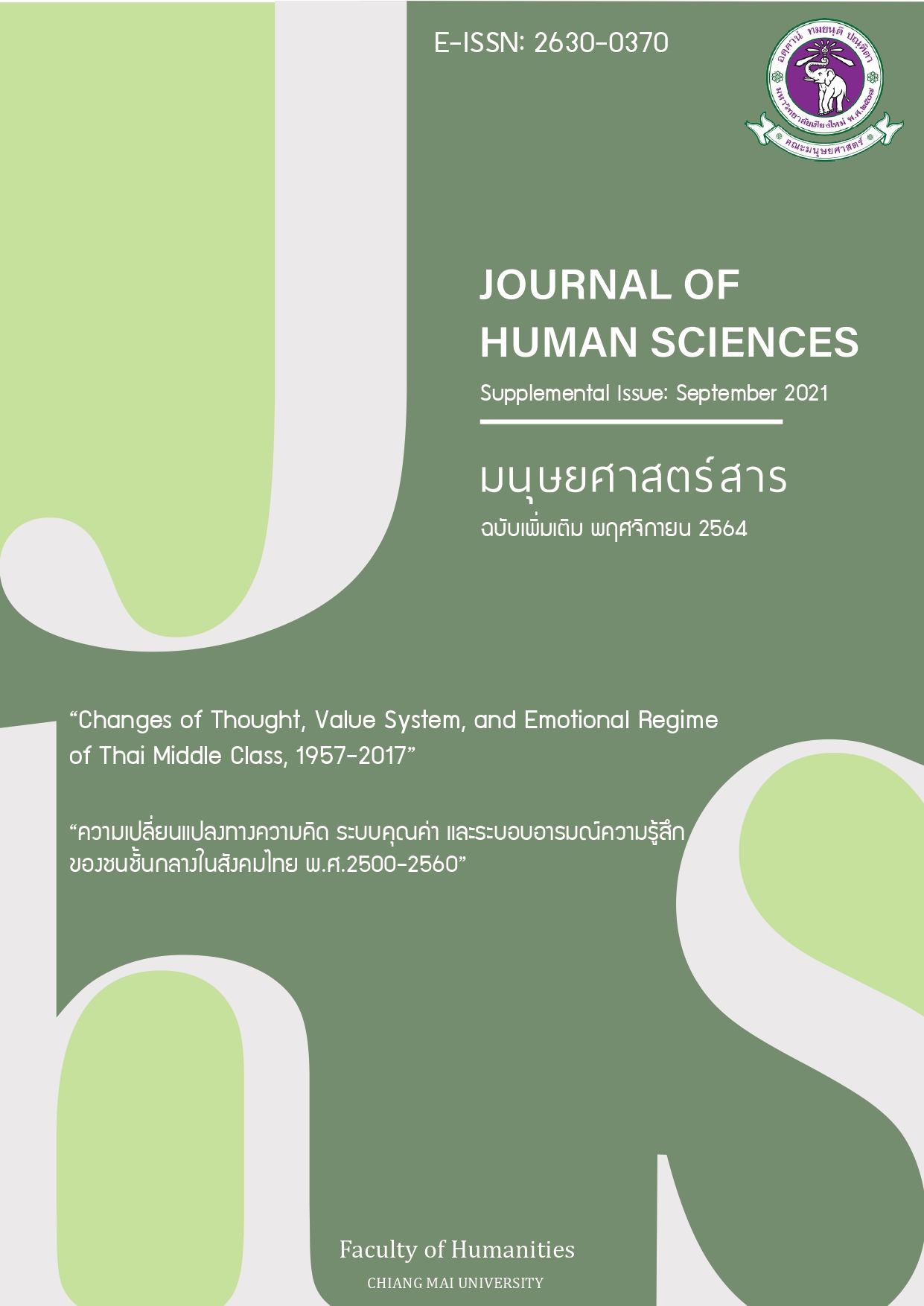อารมณ์ความรู้สึกของคนชั้นกลางต่อกรรมกร
Main Article Content
บทคัดย่อ
อารมณ์ความรู้สึกของแต่ละคนไม่ใช่อารมณ์ความรู้สึกของปัจเจกชนที่แยกขาดออกจากกัน ในแต่ละช่วงเวลาและแต่ละช่วงชั้นทางสังคมล้วนแล้วแต่มีการถักสานให้เกิดอารมณ์ความรู้สึกต่อสรรพสิ่งรอบตัว
ที่สอดคล้องและเป็นไปในทิศทางเดียวกัน เพื่อจัดความสัมพันธ์ทางเศรษฐกิจ สังคม การเมือง บทความนี้พิจารณาอารมณ์ความรู้สึกของชนชั้นกลางที่มีต่อ “กรรมกร” เพื่อที่จะทำความเข้าใจมิติที่ยังขาดการพิจารณาอย่างจริงจังจากวงวิชาการ คือมิติทางอารมณ์ความรู้สึกของชนชั้นกลางที่ส่งผลให้เกิดระบบความสัมพันธ์
ที่กดทับกรรมกรอย่างยาวนานจนถึงปัจจุบัน
ผลการศึกษาพบว่าอารมณ์ความรู้สึกของชนชั้นกลางที่มีต่อกรรมกรที่ตราตรึงในสังคมไทยนั้นก่อตัวขึ้นจากระบบคุณค่าที่ดำรงอยู่และได้รับการผลิตซ้ำตลอดมา ระบบคุณค่านี้อาจแยกออกได้เป็น 3 มิติ ได้แก่ คุณค่าในมิติความสำเร็จหรือความล้มเหลวในชีวิตที่เกิดขึ้นจากความดี/เลวส่วนบุคคล คุณค่าในมิติความสะอาด สุขภาพอนามัย และรูปลักษณ์ทางกาย และคุณค่าในมิติทางเศรษฐศาสตร์ คุณค่าเหล่านี้ ทำให้ชนชั้นกลางรับรู้และรู้สึกว่ากรรมกรมีลักษณะตรงกันข้ามกับระบบคุณค่าที่ตนเองยึดถือ กลายเป็นโครงสร้างทางอารมณ์ความรู้สึกที่ฝังลึกในจิตใจชนชั้นกลางจนมองเห็นว่ากรรมกรด้อยกว่าตนเองในทุกด้านและสมควรที่จะอยู่ในสถานะชนชั้นล่างของสังคม
Article Details
เอกสารอ้างอิง
Chantarawitoon, S. (2001). Rængngan Thai: samsipha pi bon senthang kantœpto thang setthakit khong prathet [Thai Labour: 35 Years along Thailand’s Economic Growth]. Bangkok: The Thailand Research Fund.
Eoseewong, N. (2010). Phudi V.S. nakleng bukkhalik khong phraek nawaniyai Thai [Noble V.S. Hardy Man Personality of Hero in Thai Novel]. Matichon Weekly, 30(1575). 25.
Eoseewong, N. (1993). Watthanatham khonchanklang Thai [Thai Middle Class Culture]. In Pongpaichit (eds.), Khonchan klang nai krasæ prachathipatai [Middle Class in Democracy]. Bangkok: Political Economy Center Chulalongkorn University.
Kæochanket, W. (2010). Udomkan khwampen chai nai watkam khotsana sinkha læ borikan samrap phuchai nai nittayasan phuchai [The ideology of masculinity in men's advertising discourse in men's magazines]. (Master of arts thesis, Chulalongkorn University).
Kanchala. (2014). Sưa sifun [Dirty Dress]. Bangkok: Phưan di.
Korjaranchit, W. (2002). Kan wikhro phap sanœ ‘khwam khao’ nai khotsana thorathat [A representational analysis of ‘whiteness’ in TV Ads]. (Master of arts thesis, Thammasart University).
Louiyapong, K. (1996). Kan wikhro nưaha kannam sanœ phap khong khwampen chai nai khotsana bia sing [A content analysis of the presentation of masculinity in Singha beer commercials]. (Master of arts thesis, Chulalongkorn University).
Mektrairat, N. (1992). Kan patiwat Sayam PhoSo songphansiroichetsipha [Siam Revolution 1932] Bangkok: The Foundation for the Promotion of Social Science and Humanities Textbooks Project.
Phatthrakunwanit, P. (2002). Khana suphapburut in An mai aorưang [KhanaSuphapburut in Read without Story] Bangkok: Pimarn.
Phonphirun, P. (2019). Nayobai prap khưn khachang (chak fai kanmưang) [Increasing wage policy from politician] Retrieved from https://www.posttoday.com/finance-stock/money/595665.
Jitsuchon, S. (2002). Khwamlưamlam songphanyisip (ton song): rao khuan tham aria [Inequality 2002: What we should do? (Part 2)] Retrieved from https://tdri.or.th/2020/01/thai-inequality-what-we-should-do/
Phutnak, W. (2014). Krabuankan sang attalak chon chan klang nai nawaniyai khong ngam phan wetchachiwa [THE CONSTRUCTION OF MIDDLE-CLASS IDENTITY IN NGARMPUN VEJJAJIVA'S NOVELS]. (Master of arts thesis, Chulalongkorn University).
Pitidol, T. (2016). Attalak læ botbat thang kanmưang phaitai rabop prachathipatai khong khon chanklang krungthep: koranisưksa kankhlưanwai thangkanmưang khong khabuankan kopoposo. [Identity and Political Role under Democracy of Bangkok Middle Class: A Case Study of Kopoposo Political Movement]. The Thailand Research Fund.
Ruangdetsakun, J. (2006). Seukhotsana kap attalak khong burut chon chan klang Thai nai patchuban [Advertising media and Thai middle class male identities]. (Master of arts thesis, Chulalongkorn University).
Sakworawit, A. (2016). Panha yu thi kha ræng khan tam nan tam kœnpai r fim rængngan læ khwamru tam kœnpai kan næ [What is problem? low minimum wage or low knowledge and low labor productivity?] Retrieved from https://mgronline.com/daily/detail/9590000044086.
Sattayanurak, S. (2008). Chatniyom watthanatham læ khwamkhatyæng [Nationalism, Culture and Conflict]. Chiangmai: Regional Center for Social Scienceand Sustainable Development (RCSD) Chiangmai University.
Serichantharœk, K. (2008). Watkam khwam ngam khong phuying nai sangkhom Thai: mummong phahu miti. [A Discussive Study of Thai Female Beauty: Multi-Dimensional Approach]. (Master of arts thesis, Thammasart University).
Sukmak, W. (2004). Nittayasan phuchai kap krabuankan sang khwampen chai bæp "methora sekchuan" [The construction of "Metrosexual" male representation in men magazines]. (Master of arts thesis, Chulalongkorn University).
Thanomsatsana, S. (2015). Kan plianplæng thang khwamkhit khong chon chan klang Thai kap ruang anlen Thai samai mai thotsawat songphansiroihoksip thotsawat songphansiroipætsip [The Changing Perspective of The Thai Middle Class and Modern Thai Fiction, Late 1910s–Late 1940s]. (Master of arts thesis, Chulalongkorn University).
Vilaithong, V. (2006). A cultural of Hygiene Advertising in Thailand, 1940s-early 1980s. (Doctoral of philosophy thesis, The Australian National University).


